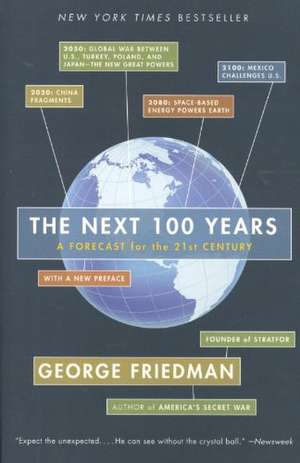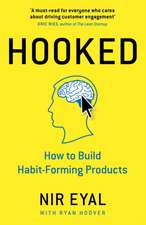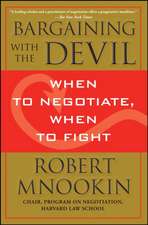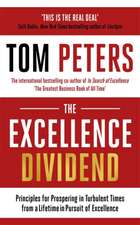The Next 100 Years: A Forecast for the 21st Century
Autor George Friedmanen Limba Engleză Paperback – 31 dec 2009
In his thought-provoking new book, George Friedman, founder of STRATFOR—the preeminent private intelligence and forecasting firm—focuses on what he knows best, the future. Positing that civilization is at the dawn of a new era, he offers a lucid, highly readable forecast of the changes we can expect around the world during the twenty-first century all based on his own thorough analysis and research. For example, The U.S.-Jihadist war will be replaced by a new cold war with Russia; China’s role as a world power will diminish; Mexico will become an important force on the geopolitical stage; and new technologies and cultural trends will radically alter the way we live (and fight wars). Riveting reading from first to last, The Next 100 Years is a fascinating exploration of what the future holds for all of us.
For continual, updated analysis and supplemental material, go to www.Stratfor.com
| Toate formatele și edițiile | Preț | Express |
|---|---|---|
| Paperback (2) | 72.16 lei 3-5 săpt. | +32.49 lei 5-11 zile |
| ALLISON & BUSBY – 18 ian 2010 | 72.16 lei 3-5 săpt. | +32.49 lei 5-11 zile |
| Anchor Books – 31 dec 2009 | 99.48 lei 6-8 săpt. | +31.42 lei 5-11 zile |
Preț: 99.48 lei
Puncte Express: 149
Preț estimativ în valută:
17.59€ • 20.97$ • 15.25£
17.59€ • 20.97$ • 15.25£
Carte tipărită la comandă
Livrare economică 16-30 martie
Livrare express 07-13 februarie pentru 41.41 lei
Specificații
ISBN-13: 9780767923057
ISBN-10: 0767923057
Pagini: 253
Dimensiuni: 130 x 203 x 23 mm
Greutate: 0.3 kg
Editura: Anchor Books
ISBN-10: 0767923057
Pagini: 253
Dimensiuni: 130 x 203 x 23 mm
Greutate: 0.3 kg
Editura: Anchor Books
Notă biografică
GEORGE FRIEDMAN is founder and chairman of Geopolitical Futures, which specializes in geopolitical forecasting. Prior to 2015, Friedman was chairman of the global intelligence company Stratfor, which he founded in 1996. Friedman is the author of six books, including the New York Times bestsellers The Next 100 Years and The Next Decade. He is a senior advisor to Gallup, Inc. He lives in Austin, Texas.
Extras
CHAPTER 1
The Dawn of the American Age
There is a deep-seated belief in America that the United States is approaching the eve of its destruction. Read letters to the editor, peruse the Web, and listen to public discourse. Disastrous wars, uncontrolled deficits, high gasoline prices, shootings at universities, corruption in business and government, and an endless litany of other shortcomings--all of them quite real--create a sense that the American dream has been shattered and that America is past its prime. If that doesn't convince you, listen to Europeans. They will assure you that America's best day is behind it.
The odd thing is that all of this foreboding was present during the presidency of Richard Nixon, together with many of the same issues. There is a continual fear that American power and prosperity are illusory, and that disaster is just around the corner. The sense transcends ideology. Environmentalists and Christian conservatives are both delivering the same message. Unless we repent of our ways, we will pay the price--and it may be too late already.
It's interesting to note that the nation that believes in its manifest destiny has not only a sense of impending disaster but a nagging feeling that the country simply isn't what it used to be. We have a deep sense of nostalgia for the 1950s as a "simpler" time. This is quite a strange belief. With the Korean War and McCarthy at one end, Little Rock in the middle, and Sputnik and Berlin at the other end, and the very real threat of nuclear war throughout, the 1950s was actually a time of intense anxiety and foreboding. A widely read book published in the 1950s was entitled The Age of Anxiety. In the 1950s, they looked back nostalgically at an earlier America, just as we look back nostalgically at the 1950s.
American culture is the manic combination of exultant hubris and profound gloom. The net result is a sense of confidence constantly undermined by the fear that we may be drowned by melting ice caps caused by global warming or smitten dead by a wrathful God for gay marriage, both outcomes being our personal responsibility. American mood swings make it hard to develop a real sense of the United States at the beginning of the twenty-first century. But the fact is that the United States is stunningly powerful. It may be that it is heading for a catastrophe, but it is hard to see one when you look at the basic facts.
Let's consider some illuminating figures. Americans constitute about 4 percent of the world's population but produce about 26 percent of all goods and services. In 2007 U.S. gross domestic product was about $14 trillion, compared to the world's GDP of $54 trillion--about 26 percent of the world's economic activity takes place in the United States. The next largest economy in the world is Japan's, with a GDP of about $4.4 trillion--about a third the size of ours. The American economy is so huge that it is larger than the economies of the next four countries combined: Japan, Germany, China, and the United Kingdom.
Many people point at the declining auto and steel industries, which a generation ago were the mainstays of the American economy, as examples of a current deindustrialization of the United States. Certainly, a lot of industry has moved overseas. That has left the United States with industrial production of only $2.8 trillion (in 2006): the largest in the world, more than twice the size of the next largest industrial power, Japan, and larger than Japan's and China's industries combined.
There is talk of oil shortages, which certainly seem to exist and will undoubtedly increase. However, it is important to realize that the United States produced 8.3 million barrels of oil every day in 2006. Compare that with 9.7 million for Russia and 10.7 million for Saudi Arabia. U.S. oil production is 85 percent that of Saudi Arabia. The United States produces more oil than Iran, Kuwait, or the United Arab Emirates. Imports of oil into the country are vast, but given its industrial production, that's understandable. Comparing natural gas production in 2006, Russia was in first place with 22.4 trillion cubic feet and the United States was second with 18.7 trillion cubic feet. U.S. natural gas production is greater than that of the next five producers combined. In other words, although there is great concern that the United States is wholly dependent on foreign energy, it is actually one of the world's largest energy producers.
Given the vast size of the American economy, it is interesting to note that the United States is still underpopulated by global standards. Measured in inhabitants per square kilometer, the world's average population density is 49. Japan's is 338, Germany's is 230, and America's is only 31. If we exclude Alaska, which is largely uninhabitable, U.S. population density rises to 34. Compared to Japan or Germany, or the rest of Europe, the United States is hugely underpopulated. Even when we simply compare population in proportion to arable land--land that is suitable for agriculture--America has five times as much land per person as Asia, almost twice as much as Europe, and three times as much as the global average. An economy consists of land, labor, and capital. In the case of the United States, these numbers show that the nation can still grow--it has plenty of room to increase all three.
There are many answers to the question of why the U.S. economy is so powerful, but the simplest answer is military power. The United States completely dominates a continent that is invulnerable to invasion and occupation and in which its military overwhelms those of its neighbors. Virtually every other industrial power in the world has experienced devastating warfare in the twentieth century. The United States waged war, but America itself never experienced it. Military power and geographical reality created an economic reality. Other countries have lost time recovering from wars. The United States has not. It has actually grown because of them.
Consider this simple fact that I'll be returning to many times. The United States Navy controls all of the oceans of the world. Whether it's a junk in the South China Sea, a dhow off the African coast, a tanker in the Persian Gulf, or a cabin cruiser in the Caribbean, every ship in the world moves under the eyes of American satellites in space and its movement is guaranteed--or denied--at will by the U.S. Navy. The combined naval force of the rest of the world doesn't come close to equaling that of the U.S. Navy.
This has never happened before in human history, even with Britain. There have been regionally dominant navies, but never one that was globally and overwhelmingly dominant. This has meant that the United States could invade other countries--but never be invaded. It has meant that in the final analysis the United States controls international trade. It has become the foundation of American security and American wealth. Control of the seas emerged after World War II, solidified during the final phase of the European Age, and is now the flip side of American economic power, the basis of its military power.
Whatever passing problems exist for the United States, the most important factor in world affairs is the tremendous imbalance of economic, military, and political power. Any attempt to forecast the twenty-first century that does not begin with the recognition of the extraordinary nature of American power is out of touch with reality. But I am making a broader, more unexpected claim, too: the United States is only at the beginning of its power. The twenty-first century will be the American century.
That assertion rests on a deeper point. For the past five hundred years, the global system has rested on the power of Atlantic Europe, the European countries that bordered on the Atlantic Ocean: Portugal, Spain, France, England, and to a lesser extent the Netherlands. These countries transformed the world, creating the first global political and economic system in human history. As we know, European power collapsed during the twentieth century, along with the European empires. This created a vacuum that was filled by the United States, the dominant power in North America, and the only great power bordering both the Atlantic and Pacific oceans. North America has assumed the place that Europe occupied for five hundred years, between Columbus's voyage in 1492 and the fall of the Soviet Union in 1991. It has become the center of gravity of the international system.
Why? In order to understand the twenty-first century, it is important to understand the fundamental structural shifts that took place late in the twentieth century, setting the stage for a new century that will be radically different in form and substance, just as the United States is so different from Europe. My argument is not only that something extraordinary has happened but that the United States has had very little choice in it. This isn't about policy. It is about the way in which impersonal geopolitical forces work.
Europe
Until the fifteenth century, humans lived in self-enclosed, sequestered worlds. Humanity did not know itself as consisting of a single fabric. The Chinese didn't know of the Aztecs, and the Mayas didn't know of the Zulus. The Europeans may have heard of the Japanese, but they didn't really know them--and they certainly didn't interact with them. The Tower of Babel had done more than make it impossible for people to speak to each other. It made civilizations oblivious to each other.
Europeans living on the eastern rim of the Atlantic Ocean shattered the barriers between these sequestered regions and turned the world into a single entity in which all of the parts interacted with each other. What happened to Australian aborigines was intimately connected to the British relationship with Ireland and the need to find penal colonies for British prisoners overseas. What happened to Inca kings was tied to the relationship between Spain and Portugal. The imperialism of Atlantic Europe created a single world.
Atlantic Europe became the center of gravity of the global system (see map, page 20). What happened in Europe defined much of what happened elsewhere in the world. Other nations and regions did everything with one eye on Europe. From the sixteenth to the twentieth century hardly any part of the world escaped European influence and power. Everything, for good or evil, revolved around it. And the pivot of Europe was the North Atlantic. Whoever controlled that stretch of water controlled the highway to the world.
Europe was neither the most civilized nor the most advanced region in the world. So what made it the center? Europe really was a technical and intellectual backwater in the fifteenth century as opposed to China or the Islamic world. Why these small, out-of-the-way countries? And why did they begin their domination then and not five hundred years before or five hundred years later?
European power was about two things: money and geography. Europe depended on imports from Asia, particularly India. Pepper, for example, was not simply a cooking spice but also a meat preservative; its importation was a critical part of the European economy. Asia was filled with luxury goods that Europe needed, and would pay for, and historically Asian imports would come overland along the famous Silk Road and other routes until reaching the Mediterranean. The rise of Turkey--about which much more will be heard in the twenty-first century--closed these routes and increased the cost of imports.
European traders were desperate to find a way around the Turks. Spaniards and Portuguese--the Iberians--chose the nonmilitary alternative: they sought another route to India. The Iberians knew of only one route to India that avoided Turkey, down the length of the African coast and up into the Indian Ocean. They theorized about another route, assuming that the world was round, a route that would take them to India by going west.
This was a unique moment. At other points in history Atlantic Europe would have only fallen even deeper into backwardness and poverty. But the economic pain was real and the Turks were very dangerous, so there was pressure to do something. It was also a crucial psychological moment. The Spaniards, having just expelled the Muslims from Spain, were at the height of their barbaric hubris. Finally, the means for carrying out such exploration was at hand as well. Technology existed that, if properly used, might provide a solution to the Turkey problem.
The Iberians had a ship, the caravel, that could handle deep-sea voyages. They had an array of navigational devices, from the compass to the astrolabe. Finally they had guns, particularly cannons. All of these might have been borrowed from other cultures, but the Iberians integrated them into an effective economic and military system. They could now sail to distant places. When they arrived they were able to fight--and win. People who heard a cannon fire and saw a building explode tended to be more flexible in negotiations. When the Iberians reached their destinations, they could kick in the door and take over. Over the next several centuries, European ships, guns, and money dominated the world and created the first global system, the European Age.
Here is the irony: Europe dominated the world, but it failed to dominate itself. For five hundred years Europe tore itself apart in civil wars, and as a result there was never a European empire--there was instead a British empire, a Spanish empire, a French empire, a Portuguese empire, and so on. The European nations exhausted themselves in endless wars with each other while they invaded, subjugated, and eventually ruled much of the world.
There were many reasons for the inability of the Europeans to unite, but in the end it came down to a simple feature of geography: the English Channel. First the Spanish, then the French, and finally the Germans managed to dominate the European continent, but none of them could cross the Channel. Because no one could defeat Britain, conqueror after conqueror failed to hold Europe as a whole. Periods of peace were simply temporary truces. Europe was exhausted by the advent of World War I, in which over ten million men died--a good part of a generation. The European economy was shattered, and European confidence broken. Europe emerged as a demographic, economic, and cultural shadow of its former self. And then things got even worse.
From the Hardcover edition.
The Dawn of the American Age
There is a deep-seated belief in America that the United States is approaching the eve of its destruction. Read letters to the editor, peruse the Web, and listen to public discourse. Disastrous wars, uncontrolled deficits, high gasoline prices, shootings at universities, corruption in business and government, and an endless litany of other shortcomings--all of them quite real--create a sense that the American dream has been shattered and that America is past its prime. If that doesn't convince you, listen to Europeans. They will assure you that America's best day is behind it.
The odd thing is that all of this foreboding was present during the presidency of Richard Nixon, together with many of the same issues. There is a continual fear that American power and prosperity are illusory, and that disaster is just around the corner. The sense transcends ideology. Environmentalists and Christian conservatives are both delivering the same message. Unless we repent of our ways, we will pay the price--and it may be too late already.
It's interesting to note that the nation that believes in its manifest destiny has not only a sense of impending disaster but a nagging feeling that the country simply isn't what it used to be. We have a deep sense of nostalgia for the 1950s as a "simpler" time. This is quite a strange belief. With the Korean War and McCarthy at one end, Little Rock in the middle, and Sputnik and Berlin at the other end, and the very real threat of nuclear war throughout, the 1950s was actually a time of intense anxiety and foreboding. A widely read book published in the 1950s was entitled The Age of Anxiety. In the 1950s, they looked back nostalgically at an earlier America, just as we look back nostalgically at the 1950s.
American culture is the manic combination of exultant hubris and profound gloom. The net result is a sense of confidence constantly undermined by the fear that we may be drowned by melting ice caps caused by global warming or smitten dead by a wrathful God for gay marriage, both outcomes being our personal responsibility. American mood swings make it hard to develop a real sense of the United States at the beginning of the twenty-first century. But the fact is that the United States is stunningly powerful. It may be that it is heading for a catastrophe, but it is hard to see one when you look at the basic facts.
Let's consider some illuminating figures. Americans constitute about 4 percent of the world's population but produce about 26 percent of all goods and services. In 2007 U.S. gross domestic product was about $14 trillion, compared to the world's GDP of $54 trillion--about 26 percent of the world's economic activity takes place in the United States. The next largest economy in the world is Japan's, with a GDP of about $4.4 trillion--about a third the size of ours. The American economy is so huge that it is larger than the economies of the next four countries combined: Japan, Germany, China, and the United Kingdom.
Many people point at the declining auto and steel industries, which a generation ago were the mainstays of the American economy, as examples of a current deindustrialization of the United States. Certainly, a lot of industry has moved overseas. That has left the United States with industrial production of only $2.8 trillion (in 2006): the largest in the world, more than twice the size of the next largest industrial power, Japan, and larger than Japan's and China's industries combined.
There is talk of oil shortages, which certainly seem to exist and will undoubtedly increase. However, it is important to realize that the United States produced 8.3 million barrels of oil every day in 2006. Compare that with 9.7 million for Russia and 10.7 million for Saudi Arabia. U.S. oil production is 85 percent that of Saudi Arabia. The United States produces more oil than Iran, Kuwait, or the United Arab Emirates. Imports of oil into the country are vast, but given its industrial production, that's understandable. Comparing natural gas production in 2006, Russia was in first place with 22.4 trillion cubic feet and the United States was second with 18.7 trillion cubic feet. U.S. natural gas production is greater than that of the next five producers combined. In other words, although there is great concern that the United States is wholly dependent on foreign energy, it is actually one of the world's largest energy producers.
Given the vast size of the American economy, it is interesting to note that the United States is still underpopulated by global standards. Measured in inhabitants per square kilometer, the world's average population density is 49. Japan's is 338, Germany's is 230, and America's is only 31. If we exclude Alaska, which is largely uninhabitable, U.S. population density rises to 34. Compared to Japan or Germany, or the rest of Europe, the United States is hugely underpopulated. Even when we simply compare population in proportion to arable land--land that is suitable for agriculture--America has five times as much land per person as Asia, almost twice as much as Europe, and three times as much as the global average. An economy consists of land, labor, and capital. In the case of the United States, these numbers show that the nation can still grow--it has plenty of room to increase all three.
There are many answers to the question of why the U.S. economy is so powerful, but the simplest answer is military power. The United States completely dominates a continent that is invulnerable to invasion and occupation and in which its military overwhelms those of its neighbors. Virtually every other industrial power in the world has experienced devastating warfare in the twentieth century. The United States waged war, but America itself never experienced it. Military power and geographical reality created an economic reality. Other countries have lost time recovering from wars. The United States has not. It has actually grown because of them.
Consider this simple fact that I'll be returning to many times. The United States Navy controls all of the oceans of the world. Whether it's a junk in the South China Sea, a dhow off the African coast, a tanker in the Persian Gulf, or a cabin cruiser in the Caribbean, every ship in the world moves under the eyes of American satellites in space and its movement is guaranteed--or denied--at will by the U.S. Navy. The combined naval force of the rest of the world doesn't come close to equaling that of the U.S. Navy.
This has never happened before in human history, even with Britain. There have been regionally dominant navies, but never one that was globally and overwhelmingly dominant. This has meant that the United States could invade other countries--but never be invaded. It has meant that in the final analysis the United States controls international trade. It has become the foundation of American security and American wealth. Control of the seas emerged after World War II, solidified during the final phase of the European Age, and is now the flip side of American economic power, the basis of its military power.
Whatever passing problems exist for the United States, the most important factor in world affairs is the tremendous imbalance of economic, military, and political power. Any attempt to forecast the twenty-first century that does not begin with the recognition of the extraordinary nature of American power is out of touch with reality. But I am making a broader, more unexpected claim, too: the United States is only at the beginning of its power. The twenty-first century will be the American century.
That assertion rests on a deeper point. For the past five hundred years, the global system has rested on the power of Atlantic Europe, the European countries that bordered on the Atlantic Ocean: Portugal, Spain, France, England, and to a lesser extent the Netherlands. These countries transformed the world, creating the first global political and economic system in human history. As we know, European power collapsed during the twentieth century, along with the European empires. This created a vacuum that was filled by the United States, the dominant power in North America, and the only great power bordering both the Atlantic and Pacific oceans. North America has assumed the place that Europe occupied for five hundred years, between Columbus's voyage in 1492 and the fall of the Soviet Union in 1991. It has become the center of gravity of the international system.
Why? In order to understand the twenty-first century, it is important to understand the fundamental structural shifts that took place late in the twentieth century, setting the stage for a new century that will be radically different in form and substance, just as the United States is so different from Europe. My argument is not only that something extraordinary has happened but that the United States has had very little choice in it. This isn't about policy. It is about the way in which impersonal geopolitical forces work.
Europe
Until the fifteenth century, humans lived in self-enclosed, sequestered worlds. Humanity did not know itself as consisting of a single fabric. The Chinese didn't know of the Aztecs, and the Mayas didn't know of the Zulus. The Europeans may have heard of the Japanese, but they didn't really know them--and they certainly didn't interact with them. The Tower of Babel had done more than make it impossible for people to speak to each other. It made civilizations oblivious to each other.
Europeans living on the eastern rim of the Atlantic Ocean shattered the barriers between these sequestered regions and turned the world into a single entity in which all of the parts interacted with each other. What happened to Australian aborigines was intimately connected to the British relationship with Ireland and the need to find penal colonies for British prisoners overseas. What happened to Inca kings was tied to the relationship between Spain and Portugal. The imperialism of Atlantic Europe created a single world.
Atlantic Europe became the center of gravity of the global system (see map, page 20). What happened in Europe defined much of what happened elsewhere in the world. Other nations and regions did everything with one eye on Europe. From the sixteenth to the twentieth century hardly any part of the world escaped European influence and power. Everything, for good or evil, revolved around it. And the pivot of Europe was the North Atlantic. Whoever controlled that stretch of water controlled the highway to the world.
Europe was neither the most civilized nor the most advanced region in the world. So what made it the center? Europe really was a technical and intellectual backwater in the fifteenth century as opposed to China or the Islamic world. Why these small, out-of-the-way countries? And why did they begin their domination then and not five hundred years before or five hundred years later?
European power was about two things: money and geography. Europe depended on imports from Asia, particularly India. Pepper, for example, was not simply a cooking spice but also a meat preservative; its importation was a critical part of the European economy. Asia was filled with luxury goods that Europe needed, and would pay for, and historically Asian imports would come overland along the famous Silk Road and other routes until reaching the Mediterranean. The rise of Turkey--about which much more will be heard in the twenty-first century--closed these routes and increased the cost of imports.
European traders were desperate to find a way around the Turks. Spaniards and Portuguese--the Iberians--chose the nonmilitary alternative: they sought another route to India. The Iberians knew of only one route to India that avoided Turkey, down the length of the African coast and up into the Indian Ocean. They theorized about another route, assuming that the world was round, a route that would take them to India by going west.
This was a unique moment. At other points in history Atlantic Europe would have only fallen even deeper into backwardness and poverty. But the economic pain was real and the Turks were very dangerous, so there was pressure to do something. It was also a crucial psychological moment. The Spaniards, having just expelled the Muslims from Spain, were at the height of their barbaric hubris. Finally, the means for carrying out such exploration was at hand as well. Technology existed that, if properly used, might provide a solution to the Turkey problem.
The Iberians had a ship, the caravel, that could handle deep-sea voyages. They had an array of navigational devices, from the compass to the astrolabe. Finally they had guns, particularly cannons. All of these might have been borrowed from other cultures, but the Iberians integrated them into an effective economic and military system. They could now sail to distant places. When they arrived they were able to fight--and win. People who heard a cannon fire and saw a building explode tended to be more flexible in negotiations. When the Iberians reached their destinations, they could kick in the door and take over. Over the next several centuries, European ships, guns, and money dominated the world and created the first global system, the European Age.
Here is the irony: Europe dominated the world, but it failed to dominate itself. For five hundred years Europe tore itself apart in civil wars, and as a result there was never a European empire--there was instead a British empire, a Spanish empire, a French empire, a Portuguese empire, and so on. The European nations exhausted themselves in endless wars with each other while they invaded, subjugated, and eventually ruled much of the world.
There were many reasons for the inability of the Europeans to unite, but in the end it came down to a simple feature of geography: the English Channel. First the Spanish, then the French, and finally the Germans managed to dominate the European continent, but none of them could cross the Channel. Because no one could defeat Britain, conqueror after conqueror failed to hold Europe as a whole. Periods of peace were simply temporary truces. Europe was exhausted by the advent of World War I, in which over ten million men died--a good part of a generation. The European economy was shattered, and European confidence broken. Europe emerged as a demographic, economic, and cultural shadow of its former self. And then things got even worse.
From the Hardcover edition.
Recenzii
“Expect the unexpected. . . . He can see without the crystal ball.”—Newsweek
“Barron’s consistently has found Stratfor’s insights informative and largely on the money—as has the company’s large client base, which ranges from corporations to media outlets and government agencies.”—Barron’s
“There is a temptation, when you are around George Friedman, to treat him like a Magic 8-Ball.”—New York Times Magazine
"Predictions have made George Friedman a hot property these days." —The Wall Street Journal
“Barron’s consistently has found Stratfor’s insights informative and largely on the money—as has the company’s large client base, which ranges from corporations to media outlets and government agencies.”—Barron’s
“There is a temptation, when you are around George Friedman, to treat him like a Magic 8-Ball.”—New York Times Magazine
"Predictions have made George Friedman a hot property these days." —The Wall Street Journal
Descriere
Friedman, a leading expert in geopolitical forecasting, turns his eye to the future. Drawing on a profound understanding of history and geopolitical patterns, "The Next 100 Years" is a compelling, realistic, and eye-opening portrait of the future.





















